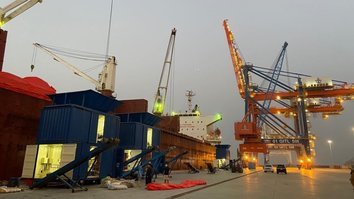PESHAWAR -- A planned revision of the Afghanistan-Pakistan Transit Trade Agreement (APTTA) should bolster trading between the two neighbouring countries, business officials say.
The agreement, first inked in 2010, sought to facilitate the movement of goods between the countries but faced implementation problems.
Meanwhile, a revision to the agreement has been in limbo since September 2015 over Afghan access to India and Pakistani access to Tajikistan.
The two sides agreed to revise the APTTA during a two-day session of the Technical Meeting on Economic Co-operation between Afghanistan and Pakistan held in Islamabad on June 27-28, and have since been working on a draft revision.
![Trucks carry transit goods to Afghanistan in 2019. [Muhammad Shakil]](/cnmi_pf/images/2019/10/11/20327-transit-585_329.jpg)
Trucks carry transit goods to Afghanistan in 2019. [Muhammad Shakil]
"Revisiting the APTTA to address common issues and making it compatible with the needs of transit trade was a long-standing demand of the Pakistani and Afghan business communities," said Zahidullah Shinwari, former president of the Sarhad Chamber of Commerce and Industry (SCCI). "The opening of the Torkham border crossing around the clock and a more result-oriented APTTA will produce a synergistic effect on Pakistan-Afghan transit trade, which has dwindled recently."
"A deal was signed in 2010 and its review was due in 2015, but certain factors affected the whole process, harming Pak-Afghan transit trade," he added.
"Introducing new clauses -- keeping in view the reservations of stakeholders -- was the need of the hour as they will directly affect the economic conditions of traders and bring the peoples of the two countries closer," Shinwari added.
"After revising the APTTA, Pakistani traders will be in a better position to explore the Afghan market for their goods and identify areas where the potential has not yet been discovered," he said.
Removing hurdles
Afghanistan's annual market for Pakistani goods currently is valued at $5 billion to $8 billion, while Pakistani annual exports to Afghanistan before the agreement were worth about $2.5 billion, according to Shinwari.
Pakistani annual exports to Afghanistan had decreased to $2.5 billion because of setbacks such as border closures and container detention charges, he added.
"The revision of the agreement will help in achieving export targets besides identifying and removing hurdles that are unfavourable for Pak-Afghan transit trade," Shinwari said.
The revised accord will help foster trade between the two countries, agreed Ahmad Shah, a trader and Afghan member of the Pakistan-Afghanistan Joint Chamber of Commerce and Industry (PAJCCI).
"We expect the agreement of Pakistan and Afghanistan to revise the transit trade agreement of 2010 will be a milestone in resolving the problems of traders on both sides," he said.
"The problems that businesses associated with transit trade grew with the passage of time because of certain flaws and faults in [the 2010 agreement], such as requiring the employment of bonded carriers for the transportation of goods," said Shah.
'An atmosphere of confidence'
"Separating politics from trade and business is also a factor that will help give direction to our efforts of bringing the peoples of both countries closer," Shah said.
"Moreover, implementation of decisions taken in joint forums is also needed to increase trade and develop an atmosphere of confidence for stakeholders to hold such meetings in the future," he added.
Zia-ul-Haq Sarhadi, former senior vice president of the PAJCCI, called the revised agreement "encouraging" for both sides.
"Exporters and importers were confronted in recent years with an uncertain situation that emerged after a deadlock between the two countries to re-evaluate and analyse" the APTTA, he said. "Developing a consensus to resolve mutual problems of Pak-Afghan transit trade is a gesture by both countries that is encouraging and a beacon of hope of a better business scenario in the days to come."
In addition, the new development will provide jobs to more than 5,000 clearing agents and transporters, he said.
"The concurrence of both Pakistan and Afghanistan to revisit the APTTA will benefit traders and business owners of both countries," said Haji Zalmay, an Afghan businessman based in Kabul.
"The agreement to resume talks on the 2010 APTTA has given hope to traders about a congenial environment where authorities will be able to better resolve common issues," he said.

![Trucks carry transit goods headed toward Afghanistan on Torkham road, Khyber District, in 2019. Traders and business owners on both sides are expecting improved transit trade after an agreement between Pakistan and Afghanistan to revise the APTTA. [Muhammad Shakil]](/cnmi_pf/images/2019/10/11/20323-pak_afghan-585_329.jpg)







Any step that helps build friendly ties between Afghanistan and Pakistan is worth taking.
Reply1 Comment(s)